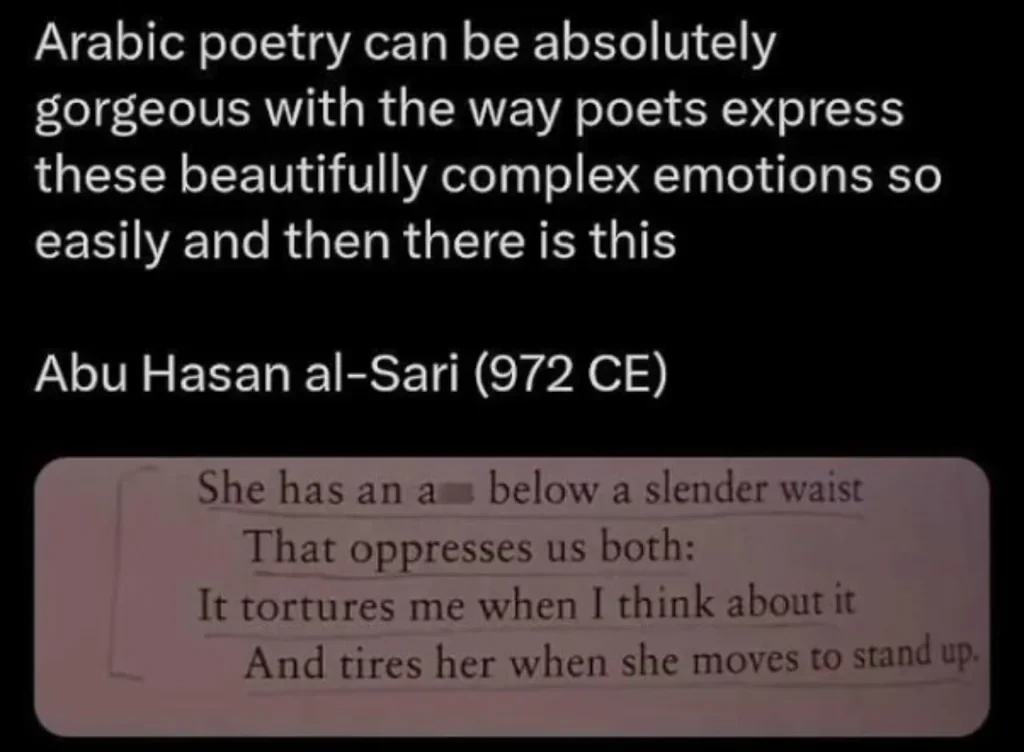this post was submitted on 12 Nov 2025
271 points (100.0% liked)
History Memes
1132 readers
751 users here now
A place to share history memes!
Rules:
-
No sexism, racism, homophobia, transphobia, assorted bigotry, etc.
-
No fascism (including tankies/red fash), atrocity denial or apologia, etc.
-
Tag NSFW pics as NSFW.
-
Follow all Piefed.social rules.
Banner courtesy of @setsneedtofeed@lemmy.world
OTHER COMMS IN THE HISTORYVERSE:
- !historymusic@quokk.au
- !historygallery@quokk.au
- !historymemes@piefed.social
- !historyruins@piefed.social
- !historyart@piefed.social
- !historyartifacts@piefed.social
- !historyphotos@piefed.social
founded 6 months ago
MODERATORS
you are viewing a single comment's thread
view the rest of the comments
view the rest of the comments

I'm with you, the "improved" translation is too verbose, tries to hard, and assumes that all poetry has to rhyme.
I'll be in the opposing camp.
Paraphrasing the wiki article, poetry is about the "aesthetic and rhythmic qualities of language" being used to evoke meaning, beyond the surface level.
This is captured well in the "proper" translation, and while it definitely suffers from the use of archaic words, it does express the situation in a much more interesting way than the alternative "love phat ass but gurl can't move".
The same logic applies to the masterpiece "I love big butts and I cannot lie", which expresses the same affection for emphatic posteriors, but does so by making a distinctive use of the rhythmic characteristics of the language. Ie., MC Hammer is a proper poet (but the song is actually by Sir Mix-a-Lot, my mistake)
(Edit for typos and clarity)
I think that was actually Sir Mix-a-lot?
You are absolutely correct, my bad. Fixed
Nah, in the short version, I knew what he was talking about. The improved version was so incomprehensible, that I had no idea he was talking about her ass, which is apparently so enormous it makes it hard for her to even move.
Sure, rhythm, structure, even how the words are being printed on a page are used as poetic elements in modern poetry. Often, pure sound is used, meaningless, fictional words, decomposed elements of a given language, syllables.
But modern poetry has moved away from long standing, fixed rhyme schemes and meter. This, along with the use of anachrononistic language, gives the translation a dated feel. I'm aware of the age of the poem, but I don't feel the ultimate goal of a translation must always be perfect accuracy to the source material and its historical context. In fact, poetry often suffers from such endeavors.
I agree with most of your points, but not the last one. I think it's perfectly OK to take an ancient work of poetry and produce a modern adaptation. This happens for many, many texts - where you can choose between a modern version that is easier to read and more "engaging" and relatable, or a more classical version where the translator tries to maintain the original nuance, structure, rhythm.
I don't know Arabic at all so I can't tell for sure, but the translation in the book just seems like a very poor attempt at translation, and so it fails as a modern adaptation, and fails as a "classical" translation. It's just bad. :)
trying too hard is like, 95% of poetry